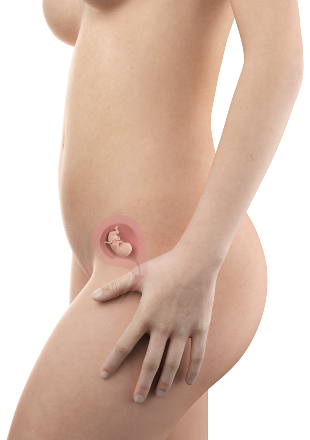Congratulations on reaching Week 9! It’s natural to have lots of feelings right now — excitement, curiosity, and even a little nervousness. You’re still at the beginning of your pregnancy, but your baby is changing in amazing ways. Right now, your little one is about the size of a grape and getting busier by the day inside your belly.
This week, your baby is growing and developing quickly. Their tiny arms and legs are stretching out, and tiny fingers and toes are beginning to form. Even eyelids are starting to cover their eyes, though they’ll stay closed for a few more months. Meanwhile, your baby’s heartbeat has become strong enough to pick up on a Doppler machine at your doctor’s office, which can be an incredible moment for many parents-to-be.

On your end, there’s a good chance you’re still experiencing some first trimester symptoms. Morning sickness, tender breasts, or feeling extra tired are all still common now. These symptoms, while not always pleasant, mean that your body is hard at work supporting your baby’s growth. Remember, every pregnancy is unique—some women feel more of these signs, while others notice only a few.
By Week 9, your uterus is expanding, but from the outside, you may not look very different yet. You might notice your waistline is a little less snug, or you could be feeling a bit bloated. Clothing might start to feel less comfortable, so consider loosening up or wearing more stretchy, forgiving outfits.
Behind the scenes, your baby’s basic organ systems are well underway, and some are beginning to function. The neck is developing, and head shape is becoming more rounded. Facial features are becoming more detailed too, hinting at your baby’s unique look. It’s a time packed with changes, all leading up toward bigger milestones in the weeks to come.
Take a deep breath and give yourself a little extra grace. You and your baby are both growing in different ways! Stay curious, listen to your body, and reach out to your doctor with any questions you might have. Week 9 is another step closer to meeting your little one.
Your Baby’s Development This Week
Welcome to Week 9 of your pregnancy! It’s an exciting time, as your baby is growing and changing quickly. While you might not see many visible changes on the outside just yet, there is a lot happening behind the scenes—even tiny details you’d never imagine. Let’s explore all the wonderful milestones your little one is reaching this week.
At just about the size of a grape, measuring roughly 0.6 to 0.7 inches (that’s around 16 to 22 millimeters), your baby already has an impressive list of new features. The days of being called an embryo are nearly over—your baby is well on their way to being called a fetus!
- Shaping Up: The tail at the base of the spine is nearly gone, so baby is starting to look more human every day. The head is still quite large compared to the rest of the body and is gently curving toward the chest, but that’s normal at this stage since the brain is growing so rapidly.
- Facial Features: Your baby’s face is becoming more detailed. Tiny eyelids are forming over the eyes, and you may spot the beginnings of a little nose. Ear lobes are taking shape, and inside the mouth, tooth buds and even taste buds are starting to develop. That first precious smile is a long way off, but pieces are coming together!
- Fingers, Toes, and Joints: This week, fingers and toes are becoming more defined—they might still be slightly webbed for now. The arms, elbows, and knees can flex, which means your baby is capable of making tiny, spontaneous movements. Although you can’t feel these little wiggles yet, an ultrasound just might capture a peek.
- Important Organs at Work: The basics for major organs are forming steadily. The four chambers of the heart are now present, and your baby’s heart is already busy beating. Internal organs, like the brain, lungs, kidneys, and digestive system, are developing more and more each day. Baby’s intestines are lengthening, and the tiny opening for the anus forms as the digestive tract continues to organize itself.
- First Movements Begin: One of the most amazing milestones this week is that your baby is starting to move. These movements are much too gentle for you to notice yet, but they’re a promising sign of growth, strength, and healthy development. Baby is gently bending and stretching as little muscles and joints practice for the active months ahead!
- Bone Development: Pieces of the skeleton are beginning to harden, though bones are still soft and flexible. The neck is also lengthening and becoming more noticeable, helping baby’s head lift a tiny bit further from their chest.
- Gender on the Horizon: Internal reproductive organs are starting to form. Whether your baby will be a boy or girl is already decided, but it’s still too soon for anyone to tell—even with an ultrasound.
Every week brings new growth, and while most of these changes are invisible for now, they all add up to a healthy start for your little one. Remember, this is a time of wonder, and your care—like eating well, taking your prenatal vitamins, and attending early checkups—helps support your baby’s amazing journey. If you have questions or just want reassurance, don’t hesitate to reach out to your healthcare provider. You’re not alone, and you’re doing a great job!
Changes in the Mother’s Body
At week 9 of pregnancy, your body is working hard to support your growing baby, and you might start to notice some new changes or feel a little different than before. Even if your bump isn’t obvious to others yet, important shifts are happening inside, laying the groundwork for months ahead.
You may feel that your clothes are just a bit snug around your waist, even though you haven’t officially “popped” yet. This is because your uterus is expanding to make space for your developing baby. Many women find that stretchy pants or loose dresses feel more comfortable at this point—don’t hesitate to choose what makes you cozy.
Hormone levels, especially those related to pregnancy like hCG and progesterone, are at their highest during week 9. These hormonal changes are responsible for most of the classic pregnancy symptoms, and you might notice some of the following:
- Nausea and Morning Sickness: Feeling queasy and possibly even throwing up is very common right now. “Morning sickness” can actually strike at any time of day. Eating small, frequent meals instead of big ones may help, and some moms find that cold drinks or dry crackers ease the discomfort.
- Bloating and Gas: As your digestive system slows down to better absorb nutrients for your baby, you may feel bloated or have extra gas. Sipping water through the day and eating fiber-rich foods, like apples or whole wheat bread, can provide some relief.
- Breast Changes: You may notice your breasts feel fuller, heavier, or more sensitive. Your body is preparing for feeding your baby later, so tenderness around the nipples is to be expected. A supportive, comfortable bra might help ease this sensitivity.
- Fatigue: It’s normal to feel more tired than usual. Growing a baby takes a lot of energy! Try to rest whenever you can, and remember that it’s okay to listen to your body and take breaks.
- Frequent Urination: Your kidneys are working overtime to support you and your baby, and your growing uterus can start to press on your bladder, making you feel like you need to pee often. If nighttime trips to the bathroom disrupt your sleep, try limiting drinks before bed, but keep hydrated during the day.
- Mood Swings: Shifting hormones can affect your emotions. You might feel weepy one moment and joyful the next. This is completely normal. Being gentle with yourself, talking to your partner, or reaching out to a trusted friend or counselor can be helpful.
You may also spot tiny blue veins on your chest or breasts. This is due to increased blood flow, helping provide more nutrients for your growing baby. While not everyone experiences every symptom, remember that each pregnancy is unique. If you notice anything that feels unusual, or symptoms that concern you, share them at your first prenatal visit. Your healthcare provider is there to support you at every step, so you don’t have to go through this journey alone.
Finally, many moms worry about what is or isn’t normal. Whether you have lots of these changes or just a few, your body is doing an amazing job. Treat yourself with kindness, prioritize rest, and remember: every change brings you one step closer to meeting your little one.
What Medical Checkups and Screenings Happen at Week 9?
At week 9 of pregnancy, you’re starting an important part of your journey: your first big prenatal checkup. This visit is designed to help you and your healthcare team learn as much as possible about your health, your baby’s growth, and any steps you can take right now for a healthy pregnancy.
Here’s what you can usually expect during this time:
- Health History Review: Your doctor or midwife will ask about your health background—including past illnesses, family medical history, and any medicines or supplements you’re taking. This helps paint a full picture of things that might affect your pregnancy.
- Physical Checkup: A general physical exam is common. They’ll check things like your blood pressure, height, and weight. This helps create a baseline to compare with future visits, so any changes can be spotted early.
- Blood and Urine Tests: You’ll likely have some important lab work done. Blood tests are used to check your iron level (for anemia), your blood type, your immunity to certain illnesses (like rubella), and your general health. Urine tests help screen for infections, diabetes, and protein levels, which are all important during pregnancy.
- Checking for Genetic Conditions: This is a good time to talk about options for genetic carrier screening and whether you may want tests that look for chromosomal conditions (like Down syndrome). Your provider will guide you based on your family history, culture, and preferences.
- Prenatal Vitamins and Supplements: Your provider will make sure you’re taking the right vitamins, especially folic acid and iron. It’s okay to ask questions about any over-the-counter medicines or herbal supplements you use.
- First Ultrasound: Some practices offer an early ultrasound around week 9. This scan checks that your pregnancy is growing as expected, confirms how many weeks along you are, and lets you see your baby’s tiny heartbeat for the very first time.
- Discussing Symptoms: Your provider wants to hear how you’re feeling. If you have morning sickness, fatigue, headaches, or any other changes, don’t be shy about sharing! They can offer tips, reassurance, or help if symptoms become tough to handle.
- Healthy Lifestyle Talking Points: You’ll get advice about food and exercise, things to avoid (like certain fish or deli meats), and the benefits of staying hydrated and getting rest. If you have questions about work, travel, or intimacy while pregnant, this is the time to ask.
Remember, this first set of checkups is about building a support plan for you and your baby. Every mom’s experience is unique, and you are encouraged to bring up any concerns or questions, even if they seem small. Building a trusting relationship with your care team now sets you up for a healthy, confident pregnancy journey.
Nutritional Tips and Physical Exercise
At Week 9, you’re likely well into the swing of new routines and sensations. A little extra care in what you eat and how you move can make a big difference for both you and your growing baby. Here are some helpful tips tailored for you this week:
- Eat Small, Frequent Meals: If you’re dealing with nausea or morning sickness, large meals may feel overwhelming. Try eating smaller, more frequent snacks throughout the day—crackers, fruit slices, or a small bowl of yogurt can help keep your stomach settled and your energy up.
- Pick Protein-Packed Foods: Your baby is developing quickly, especially muscles and organs. Include good sources of protein, such as eggs, lean meats, beans, lentils, or cottage cheese with your meals. Even a handful of nuts makes a great, protein-rich snack.
- Add Healthy Fats: Foods like avocados, olive oil, and seeds (like chia or flaxseed) provide healthy fats that support your baby’s brain and eye development. Try avocado on wholegrain toast or a spoonful of nut butter with apple slices.
- Get Creative with Veggies: If veggies are unappealing due to food aversions, try new preparations—such as blending spinach into fruit smoothies, roasting sweet potatoes for natural sweetness, or adding grated carrots to pasta sauce.
- Calcium for Growing Bones: Your baby’s skeleton is starting to form. Dairy products like milk, cheese, and yogurt, as well as non-dairy options like fortified plant milks, tofu, or almonds, can help you meet your calcium needs.
- Stay Well Hydrated: Drinking enough water supports your increased blood volume and helps keep things moving if constipation is an issue. Aim for at least 8 glasses a day, and include water-rich foods like oranges, cucumbers, or melons.
- Listen to Your Cravings—With Balance: Some cravings are normal, but moderation is key. If you crave ice cream, try a small bowl paired with berries or nuts. Focus on satisfying your body without overdoing sweet or salty foods.
Along with healthy eating, gentle movement can help ease some pregnancy symptoms and keep your mood bright:
- Take Short Walks: Even a 10-15 minute walk in your neighborhood or around your home can boost circulation, ease bloating, and freshen your mind. Don’t worry about speed—just enjoy the movement.
- Consider Prenatal Yoga or Stretching: Simple stretching or beginner prenatal yoga routines can relieve tension, help with backaches, and improve flexibility. Look for gentle online videos, but always check with your doctor first, especially if you’re new to exercise.
- Adjust to Your Energy: Fatigue is very normal now. On days you feel tired, rest. When energy returns, gentle movement can help lift your spirits and may even help with sleep.
- Avoid High-Risk Activities: This means giving up contact sports, exercise with a high risk of falling, or anything that feels uncomfortable. Your safety comes first—choose what feels gentle and pleasant for you.
Remember, every pregnancy is unique. If you’re ever unsure about foods, vitamins, or safe exercises, let your healthcare provider know—they’re there to support you every step of the way.
Weekly Checklist
Congratulations on reaching Week 9! Your body and baby are both growing and changing in amazing ways. This week, let’s focus on gentle self-care, healthy habits, and making sure you’re set up for your first big prenatal checkup. Here’s a helpful list of what you can do this week to support your wellbeing and your baby’s development:
- Schedule Your First Prenatal Appointment – If you haven’t already, now is a great time to call your healthcare provider and set up your first thorough pregnancy checkup. This is your chance to ask questions and share any health concerns.
- Start a Pregnancy Journal or Notes App – Jot down any new symptoms, questions, or changes you notice. This will help you remember details for your doctor visits and can also be a special keepsake later.
- Track Your Symptoms – Notice if nausea, tiredness, or food cravings change this week. If you have severe morning sickness or can barely keep food down, let your provider know—there are ways to help.
- Take Your Prenatal Vitamin Daily – Be consistent with a vitamin that includes folic acid, iron, and calcium to support your baby’s growing organs and bones.
- Experiment with Easy-to-Digest Foods – If nausea is making meals tough, try bland foods like crackers, toast, bananas, or applesauce. Eating smaller, more frequent snacks can help settle your stomach.
- Prioritize Hydration – Keep a water bottle nearby and sip regularly. Staying hydrated can ease fatigue and help prevent constipation, which is common now.
- Review Your Medications – Double-check all prescription and over-the-counter medicines with your healthcare provider. Some may need to be changed during pregnancy.
- Limit Exposure to Harmful Substances – Continue to avoid alcohol, smoking, certain fish like shark or swordfish, and unpasteurized foods.
- Gently Move Your Body Each Day – If your provider says it’s OK, try gentle walks, stretching, or prenatal yoga to boost mood and energy.
- Get to Know Your Family History – Ask loved ones about any inherited health conditions, as your provider might discuss genetic screenings this week or soon.
- Find Comfort for Tender Breasts – Soft bras or cotton sports bras may help with breast soreness, which is common as your body adjusts.
- Listen to Your Emotions – Mood swings are completely normal. If you ever feel overwhelmed, reach out to a loved one or your doctor. Support is important and always available.
- Check for Safe Cleaning and Personal Care Products – Read labels on cleaning products, lotions, and cosmetics. Avoid those with strong chemicals or fragrances that can irritate sensitive skin or aren’t recommended in pregnancy.
Little steps add up! Every bit of care you show yourself helps support your growing baby. Remember, there’s no such thing as a silly question—ask your healthcare team anything you’re wondering about. You’re already doing an amazing job.
When to Call Your Doctor
It’s natural to have questions or worries as your body changes in early pregnancy, but sometimes certain symptoms deserve extra attention. If you notice any signs that feel scary or unusual, don’t hesitate to reach out to your healthcare provider. Your peace of mind—and your baby’s well-being—are important.
Give your doctor’s office a call right away if you experience any of the following during Week 9:
- Bleeding that is heavy or won’t stop: Light spotting can be normal, but soaking through a pad in an hour, passing clots, or bright red bleeding should be checked out.
- Severe or persistent cramps: Mild aches can happen, but if you have strong or worsening pain in your lower belly or pelvis, especially on one side, call your doctor.
- Unusual pain in your shoulders or neck: Pain in these areas could mean something more serious is happening and should be reported right away.
- Fever over 100.4°F (38°C): A high temperature, especially with chills or body aches, may signal an infection.
- Sudden, severe headache or vision changes: A sharp headache, seeing spots, flashing lights, or changes in your eyesight need prompt attention.
- Nonstop nausea and vomiting: If you can’t keep down fluids or food for more than 24 hours, or feel dizzy and weak, let your provider know—you could get dehydrated.
- Burning or pain when you pee: This could be a sign of a urinary tract infection, which needs treatment to keep you and your baby safe.
- Severe dizziness, fainting, or trouble catching your breath: If you feel very weak, lightheaded, or can’t breathe easily, seek help immediately.
- Swelling in your face, hands, or around your eyes: While mild swelling of your feet can be normal, sudden swelling higher up can be a warning sign.
- Sudden tummy pain with vomiting or no bowel movements: If your stomach hurts badly and you’re vomiting or haven’t had a bowel movement in several days, check with your doctor.
Remember, you don’t need to wait for a crisis to reach out. If anything simply feels wrong or you can’t put your finger on it but feel worried, trust your instincts and call your healthcare team. No question is too small—your comfort and your baby’s health come first.
Preparations for Baby
Even though baby is still tiny, Week 9 is a wonderful time to gently start preparing your home and your heart for what’s ahead. These small steps can help you feel a bit more ready, and bring some calm and excitement to the journey.
- Begin a Pregnancy Journal: Jot down how you’re feeling, hopes for your baby, or even keep track of questions for your doctor. It’s a lovely keepsake and can help you spot helpful patterns over time.
- Create a Restful Space: Since tiredness is common right now, think about small ways to make your bedroom more comfortable—a cozy pillow, soft blanket, or dim lighting for relaxation.
- Discuss the News (If Ready): If you and your partner or trusted loved ones haven’t talked about your pregnancy yet, consider when and how you’d like to share your special news. Having a support network can really help later on.
- Declutter Small Areas: If you have a burst of energy, tidying one drawer or shelf a week can make later nesting much less overwhelming. No need for big projects—little bits add up!
- Plan Relaxing Moments: Treat yourself to something calming each day—like a short walk, listening to music, or a warm (not hot) bath. This is the foundation for caring for both you and baby as you grow together.
- Read and Learn Together: If you enjoy reading, start browsing gentle pregnancy books or listen to podcasts with your partner. Learning together can help you both feel involved and excited.
- Think About Baby’s Space: You don’t have to decorate a nursery yet, but it’s helpful to start imagining where baby might sleep or which areas of your home you may want to organize later.
Remember, you don’t have to do everything at once. Give yourself lots of grace, celebrate small steps, and know it’s perfectly normal to feel a mix of joy and nerves. Every bit you do now, no matter how tiny, is a loving step toward welcoming your baby.
Citations and References
- American College of Obstetricians and Gynecologists (ACOG) – Provides comprehensive guidance on fetal development, prenatal care, recommended screenings, and nutrition during the first trimester. Visit Source
- Mayo Clinic – Details fetal growth milestones, maternal body changes, prenatal appointment expectations, and essential nutrition at week 9. Visit Source
- Cleveland Clinic – Explains week-by-week fetal development, maternal symptoms, and first-trimester prenatal testing protocols. Visit Source
- National Institutes of Health (NIH) – MedlinePlus – Covers essential prenatal vitamins, recommended foods, and substances to avoid for optimal fetal development in early pregnancy. Visit Source
- Centers for Disease Control and Prevention (CDC) – Offers advice on healthy pregnancy behaviors, prenatal screenings, and nutritional recommendations, including folic acid intake. Visit Source
- World Health Organization (WHO) – Provides global recommendations for antenatal care, maternal nutrition, and guidance on foods/substances to avoid. Visit Source










